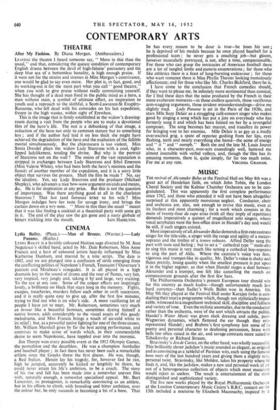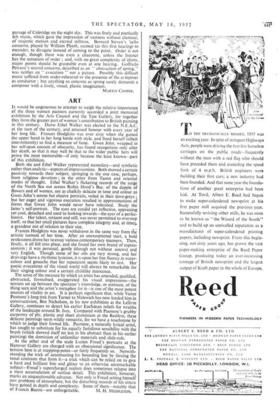MUSIC
THE revival of Alexander Balus at the Festival Hall on May 8th was a great act of Handelian faith, on which John Tobin, the London Choral Society and the Kalmar Chamber Orcbestra are to be con- gratulated. This was apparently the first complete performance since 1762, and those who attended it will not have been altogether surprised at this apparently monstrous neglect. Conductor, choir and orchestra are, alas, not enough to revive this music, even at its freshest and most charming ; for a work which consists in the main of twenty-four da capo arias (with all they imply of repetition) demands imperatively a quintet of magnificent solo singers, whose vocal acrobatics were the box-office draw in Handel's day and would be still, if such singers existed.
Most imperatively of all 4lexander Balus demands a first-rate castrato singer for the title-role, a singer with the range and agility of a mezzo- soprano and the timbre of a tenore robusto. Alfred Deller sang the part with taste and feeling ; but to set a" cathedral type "male-alto to sing this music is very much like setting a cathedral boy-soprano to sing the part of Aida. Where the castrato 's voice was firm, vigorous and trumpet-like in quality, Mr. Deller's voice is shaky and flutes prettily, losing quality when the smallest pressure is put upon it in the higher register, so that when Handel stages a duel between Alexander and a trumpet, one felt like cancelling the match on compassionate grounds after the first few bars.
The Philharmonia Orchestra's present European tour should win for this country as much kudos—though unfortunately much less hard currency—than Sadler's Wells Ballet won in America. On May 9th they played at the Festival Hall under Karajan (who is con- ducting their tour) a programme which, though not stylistically impec- cable, witnessed to a magnificent technical skill, discipline and fullness and variety of tone. Even the stylistic anomalies, due to the conductor rather than the orchestra, were of the sort which attracts the public.
Handel's Water Music was given sleek dressing and subtle, post- Wagnerian dynamics, which flattered the ear though they mis- represented Handel ; and Brahms's first symphony lost some of its poetry and personal character to deafening percussion, brass with bells too often raised in the air, and savage contrasts more suited to Tchaikovsky or Richard Strauss.
Stravinsky 's Jeu de Cartes, on the other hand, was wholly successful. This brilliantly clever jackdaw's music sounded as elegant, as original and as convincing as a tableful of Parisian wits, each using the famous bons mots of the last hundred years and giving them a slightly new, personal twist. Stravinsky, like Moliere, takes his property where he finds it, and, like the jackdaw, makes a new and personal work of art out of a heterogeneous collection of objects which most musicians would reject as useless. The result is entertainment of the most distinguished and sophisticated variety.
The five new works played by the Royal Philharmonic Orchestra at the London Contemporary Music Centre's B.B.C. concert on the 13th included a nocturne by Elizabeth Maconachy, inspired by a passage of Coleridge on the night sky. This was finely and poetically felt music, which gave the impression of vastness without clamour, of majestic motion and eternal stillness. Bernard Steven's 'cello concerto, played by William Pleeth, seemed (at this first hearing) to meander, to divagate instead of coming to the point. Order is not enough, though there was even a chaconne, unless the listener has the sensation of order ; and, with no great complexity of idiom, major points should be graspable even at one hearing. Goffredo Petrassi's second concerto, described as an "abstraction of spring," was neither an " evocation " nor a picture. Possibly this difficult music suffered from under-rehearsal or the presence of the cc mposer as conductor ; but anything so concrete as spring surely demands a composer with a lively, visual, plastic imagination.
MARTIN COOPER.



































 Previous page
Previous page